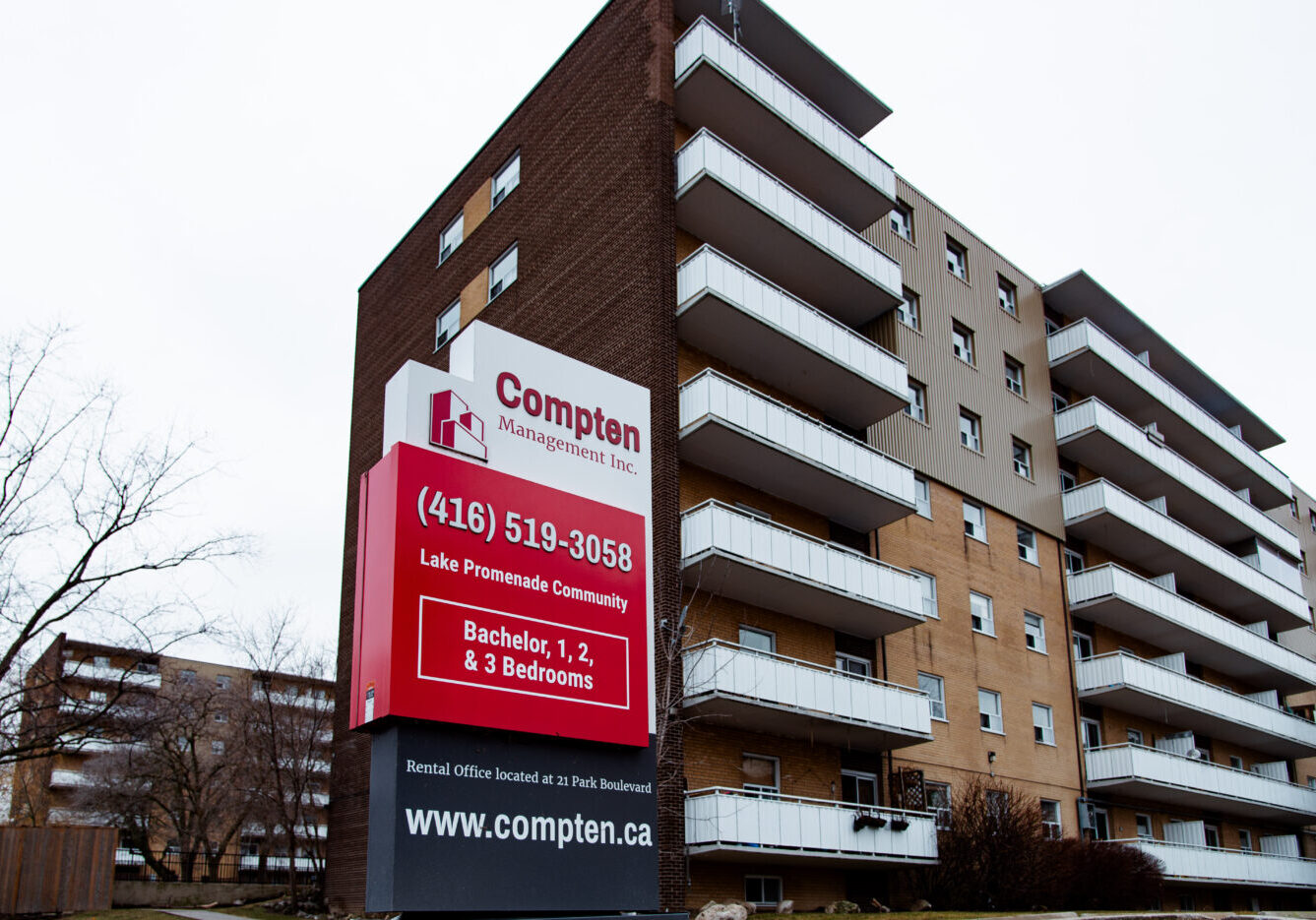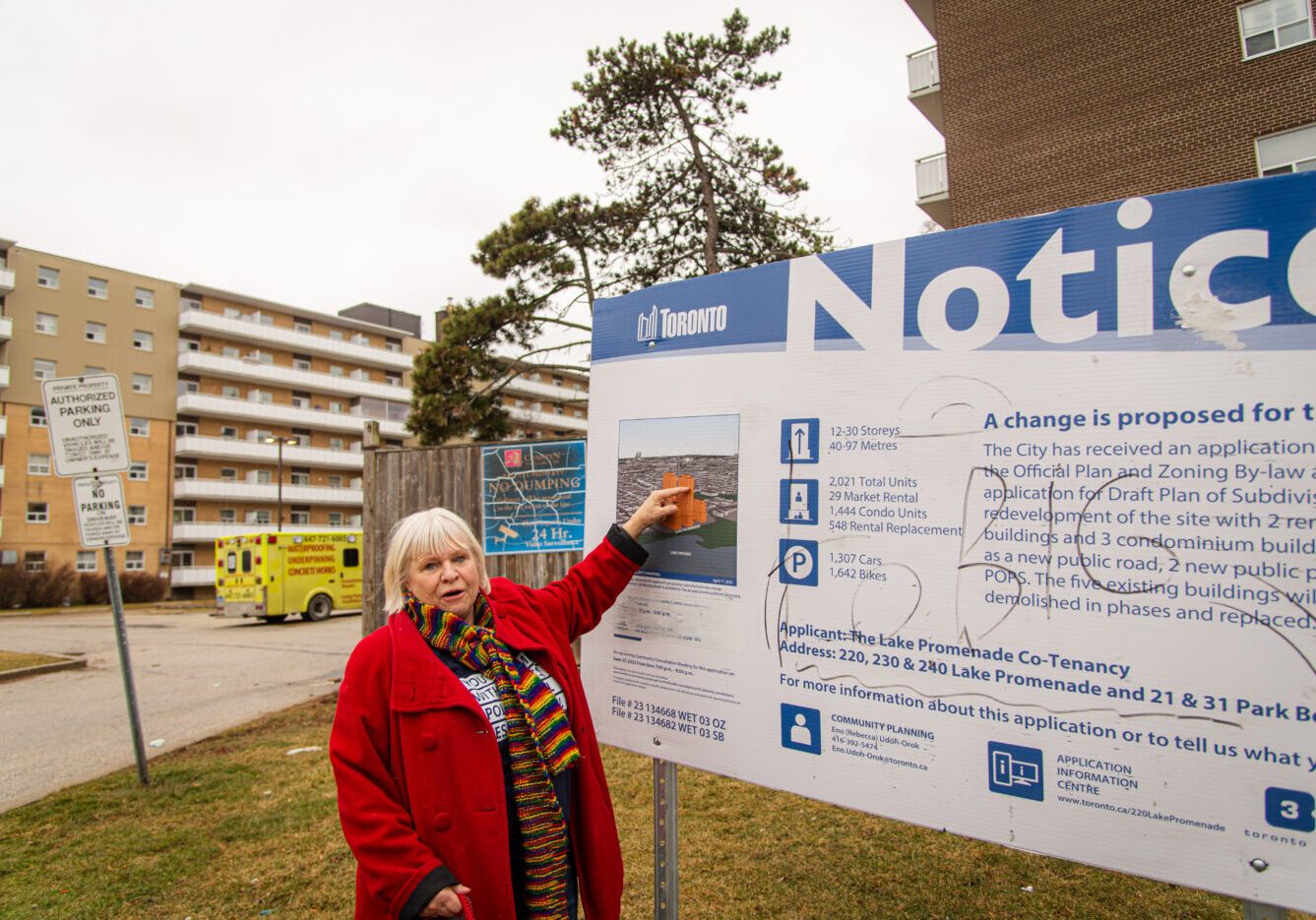THE GREEN LINE
ACTION JOURNEY STORY
HOW ‘DEMOVICTIONS’ BLOW UP AFFORDABLE RENTALS — AND THE COMMUNITIES THAT RELY ON THEM
One thousand tenants in five Long Branch apartments could be displaced in a proposed development, destroying what some have called home for decades.

Patti Pokorchak, a longtime resident of 230 Lake Prom., says her 'idyllic' community is at risk of being destroyed and becoming Canada’s largest-ever demoviction — affecting more than 1,000 renters in 548 units.


ALOYSIUS WONG
Toronto Metropolitan University Master of Journalism graduate. Lives in North York where he prays that the Eglinton Crosstown will eventually be completed.
March 11, 2024
This story is part of The Green Line's Action Journey on Toronto's housing crisis. Our seven-part story series examines the impossible climb towards home ownership, precarious rental situations and the pipeline from unaffordability to living on the streets.
Sign up for our storytelling event and Story Circle on March 19, 2024, where attendees will share their experiences with the city's housing market and brainstorm community-led solutions to navigate housing in Toronto. Dinner and refreshments will be provided.
A plan to destroy over 500 rental units have lit a fuse among tenants across five buildings in southwest Toronto.
Patti Pokorchak, 69, has been living in her Long Branch apartment at 230 Lake Prom. since 2009. Pokorchak describes her five-building, seven-storey complex as “shabby chic”; although the buildings are ageing (she had to call 311 to get the stairwells painted after five years), she’s treated to a “multimillion-dollar view” of Lake Ontario at an affordable price. But most of all, she says, the “idyllic” community is what draws her in.
“It's really the community that I just fell in love with,” says Pokorchak, an entrepreneur and adjunct professor at Toronto Metropolitan University’s Ted Rogers School of Management. “I have this relationship with my neighbours that we look after each other.”
But now, she says their way of life is at risk. A proposed development by The Lake Promenade Co-Tenancy would demolish the complex to build two rental apartments and three condos ranging from 12 to 30 storeys. Pokorchak says that amounts to a demoviction, in which modestly priced rental housing is torn down, often in favour of pricey, privately owned condos. The developers say it would quadruple housing density on the property.
If approved, according to Pokorchak, this would be Canada’s largest-ever demoviction — affecting more than 1,000 renters in 548 units.
In November 2023, a data analysis by the Investigative Journalism Foundation found that a record number of rental units — nearly 1,500 — were approved for demolition last year. What’s more, the number of units approved for demolition more than doubled from 332 in 2018 to 826 in 2019, after provincial rent control was removed for buildings constructed after Nov. 15, 2018.
“It's inhumane,” Pokorchak says. “It's absolutely ruthless. I think it's cruel. I think it's just abominable.”
She emphasizes that it would be equally unjust to evict 558 homeowners to densify the neighbourhood, and that renters should have the same rights since they're also taxpayers.
Pokorchak says older tenants who’ve grown to rely on their fellow residents are particularly vulnerable, with some literally preferring to die than be forced to move.
“Some of them are threatening MAID [medical assistance in dying],” she explains, describing two of her elderly neighbours. “They're at that age. They're fragile, in their 90s. They've lived there for 40, 50 years. They're not moving.”
Another one of Pokorchak’s neighbours, Elaine, has lived in the building for most of her life — having moved in 60 years ago at the age of seven. Elaine’s building would be the first to be demolished in the new plan.
“She's never in her life ever looked for an apartment — ever,” Pokorchak says. “She doesn't have internet. She's not tech-savvy. She doesn't have a car.”
“What do you say to these people?”
Fuelled by a passion to protect her home, Pokorchak volunteered with the tenant advocacy group No Demovictions when it began organizing at her building. She started an online petition opposing the demolition, which now has more than 800 signatures.

Many residents of the Lake Promenade Community have lived there for decades, with some calling it home for 50 to 60 years. More than 800 people have signed a petition opposing a proposed development to demolish the rental apartments in favour of five new buildings over the next 10 to 15 years.

EXPLODING PRICES
Although tenants would be legally entitled to return to the new building once completed, they’d have to pay more out of pocket while being displaced in the interim.
The City requires the developers to subsidize rent for the unit that tenants are displaced to, but only equivalent to the difference between market rent and the average rent calculated by the Canada Mortgage and Housing Corporation (CMHC) — not tenants’ current rents, which can be far lower for longtime residents in rent-controlled buildings.
Development won’t be completed for another 10 or 15 years — a timeline that Pokorchak says would break apart the fabric of her community. Although she recognizes the need to densify and increase Toronto’s housing supply, Pokorchak argues that there are better approaches.
“We need, probably, more co-ops, more community housing, more rent control,” she explains. “Housing is a human right, which [means it] should not be commercialized.”
Bousfields Inc., planning consultants for The Lake Promenade Co-Tenancy, did not immediately respond to a request for comment.
However, in its application to the City of Toronto to develop the site, Bousfields Inc. writes that their proposal would support “intensification and a range of housing options through the optimization of an underutilized site within the existing built-up urban area that is well served by municipal infrastructure.”

A City of Toronto notice outlines the proposed development by The Lake Promenade Co-Tenancy, which owns the five-building complex. The developers say the plan would help densify the neighbourhood, but Pokorchak says there are better places in the city to build housing without destroying existing homes.

In an emailed statement to The Green Line, the City says it recognizes that demolitions “have challenging impacts on existing tenants and is very much engaged with residents and the community as a whole.” It added that the proposed development meets the City’s policy to replace all existing rental units, and that its application plans for a “phased construction schedule” that involves building replacement rental units before demolishing all existing ones.
But Pokorchak says it’s possible to add density without disrupting people’s homes. She argues that there are better places in the city to densify housing, especially near available transit. She points to a proposed redevelopment of what’s currently Six Points Plaza near Bloor Street West and Dundas Street West, steps away from Kipling subway station, as a prime example.
Pokorchak says 75 per cent of the spaces in the proposed development would be one-bedroom units that aren’t “family friendly,” and that most of the new buildings wouldn’t be affordable for current residents.
Her message, ultimately, boils down to this: “Stop destroying homes to build more homes.”
Next in The Green Line Housing Crisis Action Journey Story Series: It took 10 years to fix this woman's bathroom. But her landlord is still jacking up rent.
Fact-Check Yourself
Sources and
further reading
Don't take our word for it —
check our sources for yourself.
